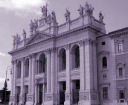Holy Thursday

The Last Supper - Chartres Cathedral - stained glass window (detail)
Family Activities | Stations of the Cross | Christian Passover Seder | Readings | Adoremus: Articles and Document on Footwashing
Nos autem gloriari oportet in cruce Domini nostri Iesu Christi,
in quo est salus, vita et resurrectio nostra per quem salvati et liberati sumus.We should glory in the cross of our Lord Jesus Christ, for He is our salvation, our life and our resurrection; through Him we are saved and made free. (cf. Galations 6:14)
-- Entrance Antiphon for Holy Thursday
HOLY THURSDAY is the most complex and profound of all religious observances, saving only the Easter Vigil. It celebrates both the institution by Christ Himself of the Eucharist and of the institution of the sacerdotal priesthood (as distinct from the "priesthood of all believers") for in this, His last supper with the disciples, a celebration of Passover, He is the self-offered Passover Victim, and every ordained priest to this day presents this same sacrifice, by Christ's authority and command, in exactly the same way. The Last Supper was also Christ's farewell to His assembled disciples, some of whom would betray, desert or deny Him before the sun rose again.
On Holy Thursday morning there is a special Mass in Cathedral Churches, celebrated by the bishop and as many priests of the diocese as can attend, because it is a solemn observance of Christ's institution of the priesthood at the Last Supper. At this "Chrism Mass" the bishop also blesses the Oil of Chrism used for Baptism, Confirmation and Anointing of the sick or dying. The bishop may wash the feet of twelve of the priests, to symbolize Christ's washing the feet of His Apostles, the first priests.
The evening Holy Thursday Liturgy, marks the end of Lent and the beginning of the sacred "Triduum" ("three days") of Holy Week, which culminates in the Easter Vigil, and concludes at Vespers on the evening of Easter day (see Paschale Solemnitatis, §§ 38-40). The Mass begins in the evening, because Passover began at sundown; it commemorates Our Lord's institution of the Holy Eucharist at the Last Supper. It also shows both the worth God ascribes to the humility of service, and the need for cleansing with water (a symbol of baptism) in the Mandatum, washing, commemorating Jesus' washing the feet of His apostles, as well as in the priest's stripping and washing of the altar. Cleansing, in fact, gave this day of Holy Week the name Maundy Thursday.
The action of the Church on this night also witnesses to the Church's esteem for Christ's Body present in the consecrated Host in the Adoration of the Blessed Sacrament, carried in solemn procession to the flower-bedecked Altar of Repose, where it will remain "entombed" until the communion service on Good Friday. No Mass will be celebrated again in the Church until the Easter Vigil proclaims the Resurrection.
And finally, there is the continued Adoration of the Blessed Sacrament by the people during the night, just as the disciples stayed with the Lord during His agony on the Mount of Olives before the betrayal by Judas.
There is such an abundance of symbolism in the solemn celebration of the events of Holy Thursday layer upon layer, in fact that we can no more than hint at it in these few words. For many centuries, the Last Supper of Our Lord has inspired great works of art and literature, such as the glorious stained glass window in Chartres cathedral (above), Leonardo's ever popular (and much imitated) Last Supper in the 16th century; and a reminiscence called Holy Thursday, by the French novelist François Mauriac, written in the 1930s. (A chapter of Mauriac's meditation was reprinted in Voices, Lent-Easter 2002, with permission from Sophia Institute Press).Family Activities for Holy Thursday
When you eat this bread and drink this cup
you proclaim the Lord's death, until He comes again.
I Corinthians 11:26
We have prepared a Christian adaptation of a Passover Seder, simple enough for use in families with young children. This special meal stresses the Christian significance of elements of the traditional Jewish Passover meal (seder) as it may have been celebrated in our Lord's time. It is neither a re-enactment of the Last Supper, nor a Jewish service. But we believe this festive family meal can be a very expressive way of helping young children to understand more about the historic origins of their faith as well as the importance of this day of Holy Week. (This is in the full edition of the Family Sourcebook for Lent and Easter. You may make photocopies of the service so everyone can have one.)
Maundy Thursday's emphasis on ritual washing also gave rise to the ancient tradition of spring cleaning, evidently related to the Jewish custom of ritually cleaning the home in preparation for the Feast of Passover. Everything was to be cleaned and polished in preparation for the Easter celebration. You can tell children about this tradition and ask to them to clean their rooms in order to observe Maundy Thursday. (Be sure to let us know if this works!)
Adults and children who are old enough to accompany their parents can return to Church after Mass for a period of Adoration of the Blessed Sacrament. If this is not possible, candles can be lighted and special prayers could be said after returning home from Mass and before bedtime. To give you some ideas, on the Stations of the Cross page we have included suggestions for a family observance of the Stations (also known as Via Crucis, or Way of the Cross) as a form of Tenebrae.
Chrism Mass
Collect:
Father,
by the power of the Holy Spirit
You anointed Your own Son Messiah and Lord of creation;
You have given us a share in His consecration
to priestly service in Your Church.
Help us to be faithful witnesses in the world
to the salvation Christ won for all mankind.
We ask this through our Lord Jesus Christ, Your Son,
who lives and reigns with You and the Holy Spirit,
one God, for ever and ever. +Amen.First Reading: Isaiah 61:1-3a, 6a, 8b-9
The Spirit of the Lord God is upon me, because the Lord has anointed me to bring good tidings to the afflicted; He has sent me to bind up the brokenhearted, to proclaim liberty to the captives, and the opening of the prison to those who are bound; to proclaim the year of the Lord's favor, and the day of vengeance of our God; to comfort all who mourn; to grant to those who mourn in Zion -- to give them a garland instead of ashes, the oil of gladness instead of mourning, the mantle of praise instead of a faint spirit; that they may be called oaks of righteousness, the planting of the Lord, but you shall be called the priests of the Lord, men shall speak of you as the ministers of our God
I will faithfully give them their recompense, and I will make an everlasting covenant with them. Their descendants shall be known among the nations, and their offspring in the midst of the peoples; all who see them shall acknowledge them, that they are a people whom the Lord has blessed.Second Reading: Revelation 1:5-8
From Jesus Christ the faithful witness, the first-born of the dead, and the ruler of kings on earth.
To Him who loves us and has freed us from our sins by His blood and made us a kingdom, priests to His God and Father, to Him be glory and dominion for ever and ever. Amen. Behold, He is coming with the clouds, and every eye will see Him, every one who pierced Him; and all tribes of the earth will wail on account of Him. Even so. Amen.
"I am the Alpha and the Omega," says the Lord God, who is and who was and who is to come, the Almighty.Gospel Reading:Luke 4:16-21
He[Jesus] came to Nazareth, where He had been brought up; and He went to the synagogue, as His custom was, on the sabbath day. And He stood up to read; and there was given to him the book of the prophet Isaiah. He opened the book and found the place where it was written, "The Spirit of the Lord is upon me, because He has anointed me to preach good news to the poor. He has sent me to proclaim release to the captives and recovering of sight to the blind, to set at liberty those who are oppressed, to proclaim the acceptable year of the Lord." And He closed the book, and gave it back to the attendant, and sat down; and the eyes of all in the synagogue were fixed on Him. And He began to say to them, "Today this scripture has been fulfilled in your hearing."Mass of the Lord's Supper
Collect:
God our Father,
we are gathered here to share in the supper
which Your only Son left to his Church to reveal his love.
He gave it to us when He was about to die
and commanded us to celebrate it as the new and eternal sacrifice.
We pray that in this Eucharist
we may find the fullness of love and life.
Grant this through our Lord Jesus Christ, Your Son,
who lives and reigns with You and the Holy Spirit,
one God, for ever and ever. +Amen.
First Reading: Exodus 12:1-8, 11-14
The Lord said to Moses and Aaron in the land of Egypt, "This month shall be for you the beginning of months; it shall be the first month of the year for you. Tell all the congregation of Israel that on the tenth day of this month they shall take every man a lamb according to their fathers' houses, a lamb for a household; and if the household is too small for a lamb, then a man and his neighbor next to his house shall take according to the number of persons; according to what each can eat you shall make your count for the lamb. Your lamb shall be without blemish, a male a year old; you shall take it from the sheep or from the goats; and you shall keep it until the fourteenth day of this month, when the whole assembly of the congregation of Israel shall kill their lambs in the evening. Then they shall take some of the blood, and put it on the two doorposts and the lintel of the houses in which they eat them. They shall eat the flesh that night, roasted; with unleavened bread and bitter herbs they shall eat it.
In this manner you shall eat it: your loins girded, your sandals on your feet, and your staff in your hand; and you shall eat it in haste. It is the Lord's passover. For I will pass through the land of Egypt that night, and I will smite all the first-born in the land of Egypt, both man and beast; and on all the gods of Egypt I will execute judgments: I am the Lord. The blood shall be a sign for you, upon the houses where you are; and when I see the blood, I will pass over you, and no plague shall fall upon you to destroy you, when I smite the land of Egypt.
"This day shall be for you a memorial day, and you shall keep it as a feast to the Lord; throughout your generations you shall observe it as an ordinance for ever.Second Reading: 1 Corinthians 11:23-26
For I received from the Lord what I also delivered to you, that the Lord Jesus on the night when He was betrayed took bread, and when He had given thanks, He broke it, and said, "This is My body which is for you. Do this in remembrance of Me." In the same way also the cup, after supper, saying, "This cup is the new covenant in My blood. Do this, as often as you drink it, in remembrance of Me." For as often as you eat this bread and drink the cup, you proclaim the Lord's death until He comes.Gospel Reading:John 13:1-15
Now before the feast of the Passover, when Jesus knew that His hour had come to depart out of this world to the Father, having loved His own who were in the world, He loved them to the end. And during supper, when the devil had already put it into the heart of Judas Iscariot, Simon's son, to betray Him, Jesus, knowing that the Father had given all things into His hands, and that He had come from God and was going to God, rose from supper, laid aside His garments, and girded Himself with a towel. Then He poured water into a basin, and began to wash the disciples' feet, and to wipe them with the towel with which He was girded. He came to Simon Peter; and Peter said to him, "Lord, do you wash my feet?" Jesus answered him, "What I am doing you do not know now, but afterward you will understand." Peter said to Him, "You shall never wash my feet." Jesus answered him, "If I do not wash you, you have no part in Me." Simon Peter said to Him, "Lord, not my feet only but also my hands and my head!" Jesus said to him, "He who has bathed does not need to wash, except for his feet, but he is clean all over; and you are clean, but not every one of you." For He knew who was to betray Him; that was why He said, "You are not all clean."
When He had washed their feet, and taken His garments, and resumed His place, He said to them, "Do you know what I have done to you? You call me Teacher and Lord; and you are right, for so I am. If I then, your Lord and Teacher, have washed your feet, you also ought to wash one another's feet. For I have given you an example, that you also should do as I have done to you.
Adoremus: Articles and Document on Footwashing:
The Footwashing -- Jesus Christ Establishes the New Covenant Before Calvary -- by The Rev. Msgr. Anthony A. LaFemina [March 2006]Relevant paragraphs of Paschale Solemnitatis follow:
45. Careful attention should be given to the mysteries that are commemorated in this Mass: the institution of the Eucharist, the institution of the priesthood, and Christ's command of brotherly love; the homily should explain these points.
51. The washing of the feet of chosen men [viri selecti] which, according to tradition, is performed on this day, represents the service and charity of Christ, who came "not to be served, but to serve." [58] This tradition should be maintained, and its proper significance explained.

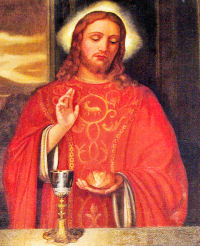
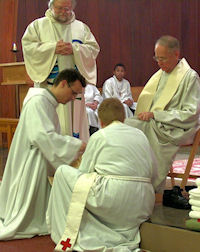 During the evening of Holy Thursday, the Mass of the Lord's Supper is celebrated. It is celebrated in the evening because the Passover began at sundown. There is only one Mass, at which the whole community and priests of the parish participate. This is a very joyful Mass, as we recall the institution of the Holy Eucharist and the priesthood. The priests wear white vestments, the altar is filled with flowers, the Gloria is sung and the bells are rung. After the Gloria, we shall not hear organ music and the bells until the Easter Vigil. The Liturgy of the Mass recalls the Passover, the Last Supper, which includes the Washing of the Feet. The hymn Ubi Caritas or Where Charity and Love Prevail is usually sung at this time. After the Communion Prayer, there is no final blessing. The Holy Eucharist is carried in procession through Church and then transferred into a place of reposition, usually a side chapel. The hymn Pange Lingua is also usually sung at this time.
During the evening of Holy Thursday, the Mass of the Lord's Supper is celebrated. It is celebrated in the evening because the Passover began at sundown. There is only one Mass, at which the whole community and priests of the parish participate. This is a very joyful Mass, as we recall the institution of the Holy Eucharist and the priesthood. The priests wear white vestments, the altar is filled with flowers, the Gloria is sung and the bells are rung. After the Gloria, we shall not hear organ music and the bells until the Easter Vigil. The Liturgy of the Mass recalls the Passover, the Last Supper, which includes the Washing of the Feet. The hymn Ubi Caritas or Where Charity and Love Prevail is usually sung at this time. After the Communion Prayer, there is no final blessing. The Holy Eucharist is carried in procession through Church and then transferred into a place of reposition, usually a side chapel. The hymn Pange Lingua is also usually sung at this time. 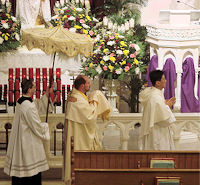 When the Eucharist is processed to the altar of repose after the Mass of the Lord's Supper, we should remain in quiet prayer and adoration, keeping Christ company. There is a tradition, particularly in big cities with many parishes, to try and visit seven churches and their altar of repose during this evening.
When the Eucharist is processed to the altar of repose after the Mass of the Lord's Supper, we should remain in quiet prayer and adoration, keeping Christ company. There is a tradition, particularly in big cities with many parishes, to try and visit seven churches and their altar of repose during this evening. 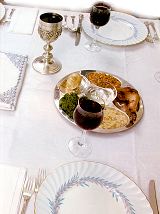 In imitation of Christ's last supper, many Christians prepare a seder meal or the pasch. Celebrating a paschal meal helps us comprehend the plan of redemption. We see the lamb, cooked whole, with no bones broken, foreshadowing the death of Christ, the Lamb of God. We eat the unleavened bread and recall to mind the Eucharist. We eat the whole meal in prayerful reminder of that Last Supper that Jesus spent with His apostles, His friends, instituting Holy Orders and leaving His greatest gift, the Holy Eucharist.
In imitation of Christ's last supper, many Christians prepare a seder meal or the pasch. Celebrating a paschal meal helps us comprehend the plan of redemption. We see the lamb, cooked whole, with no bones broken, foreshadowing the death of Christ, the Lamb of God. We eat the unleavened bread and recall to mind the Eucharist. We eat the whole meal in prayerful reminder of that Last Supper that Jesus spent with His apostles, His friends, instituting Holy Orders and leaving His greatest gift, the Holy Eucharist. 